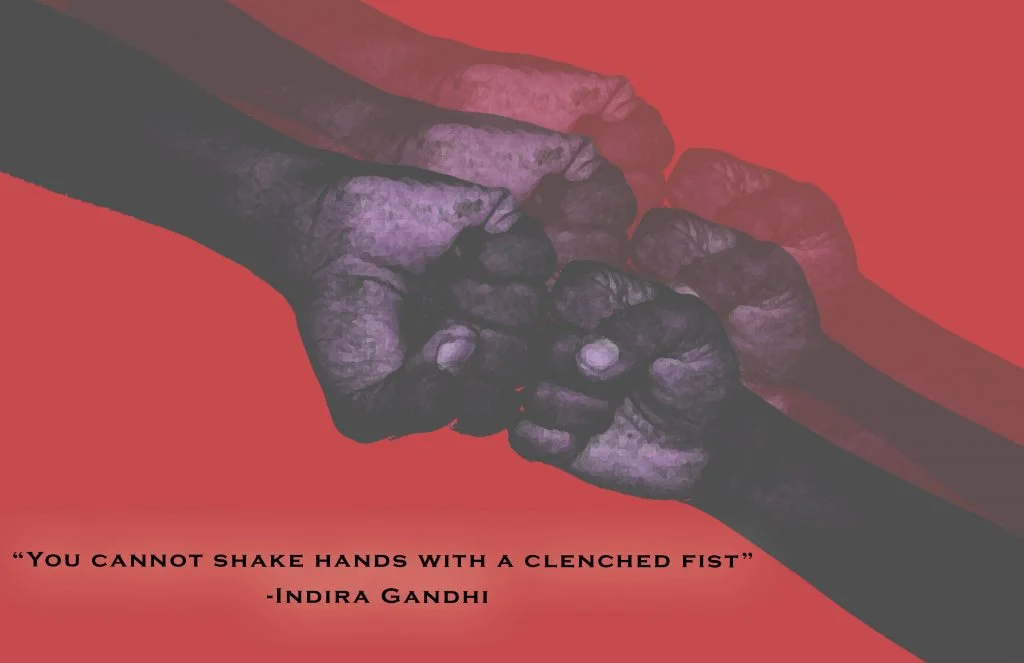Universal Protest
The desire for positive change is a common denominator
© Ilene Bergelson and Lifemoves Health, LLC | Artist: S.Sood
I said I wouldn't do it and now I've done it twice. Consider this post’s mentioning current events another anomaly, rather than a new normal.
Once upon a time very recently, I noticed how many of us today hold differing opinions, quite passionately, on important matters. As a woman who has never been a Girl Scout but apparently thinks like one, in anticipation of our need to voice those opinions productively, I thought it'd be good to get prepared. I decided to attend a training on the art of demonstrating peacefully.
Honestly, I had some trepidation about this training. What skills would they teach us? I was there to learn how to demonstrate peacefully and effectively and, of course, what to do if tear gas, rubber bullets or mob mentality from either side let loose and unhinged people's better judgment.
The training started out well enough. Our facilitator, Leigh* (name changed), has extensive experience with protests of all kinds and he emphasized the importance of being calm, kind and safe. Early on he helped us to see the difference between simply chanting and creating protest songs, and we learned to recognize the power melody can give to a message.
And then he taught us something that I couldn't quite get behind.
In training programs, it's common to introduce a song or other sound cue as a signal for people to end whatever activity they may be doing and rejoin the group. Leigh taught us a song as our signal. If we heard it, we were to finish what we were doing and join in singing the song until we all were singing and thus ready for whatever was next. The song went like this:
Oh America,
Don't believe their lies
Their policies of hate
Will destroy our children's lives.
Leigh told us the song was created for a rally in D.C. He said it was for a protest regarding education. We were given no other details.
Committed to the training, we drilled this song until we had it down pat. Yet every time we had to sing it, we sounded weak. Unconvinced. I fumbled the words. It seemed I couldn't get the lyrics to stick and that I was not the only one. I had to ask myself, "Why?"
By the end of the 3-hour training, I had my answer. My block was because I felt the song’s protest was aimed at the wrong target. Why weren't we protesting the action and the misinformation, instead of insulting individuals? It felt like we made our grievance personal, and focused on people instead of principle.
Now I don't know enough about the situation that led to those lyrics to say whether or not I would agree with its author. Regardless, I kept coming back to craving a shift in the language that would put the focus on the true offender in my eyes.
Oh America
Don't believe the lies
Policies of hate
Will destroy our children's lives
By switching the personalizing pronoun "their" with the more universal article "the" and removing “Their” from before "policies," the protest shifted toward being against policies of hate in general, rather than asserting that a specific group was engaging in policies of hate. The song felt different instantly. It was infinitely easier to sing with conviction. It also felt like more people would identify with it.
Less than a week later, I was at a very peaceful march with one of the people I met at the training and had a chance to test my theory. Lo and behold, the song we had learned didn't sit well with her either! I shared the edit I'd made and she felt the same relief I did. So did the other people standing nearby.
Thanks to that facilitator, and a little soul-searching, I really did learn a lot about the way I would like to peacefully demonstrate.
Our downward thumbs and pointed fingers are best directed toward concepts and actions, not at each other.
It looks like there will be lots of opportunities in the coming weeks and months for us to explore our feelings about the issues of the day. There may be times when we feel that the responsible parties need to be identified and held accountable.
My hope is that we can approach such moments from an intention to share a message that can be heard – a message that contributes to the positive ripple effect we wish to see in the world. The venting of frustrations (a frequent unconscious, default intention in heated moments) only falls on deaf ears.
Honesty does not have to be brutal and dissent does not have to divide us.
And as you can probably guess, it's okay with me if you don't agree.

